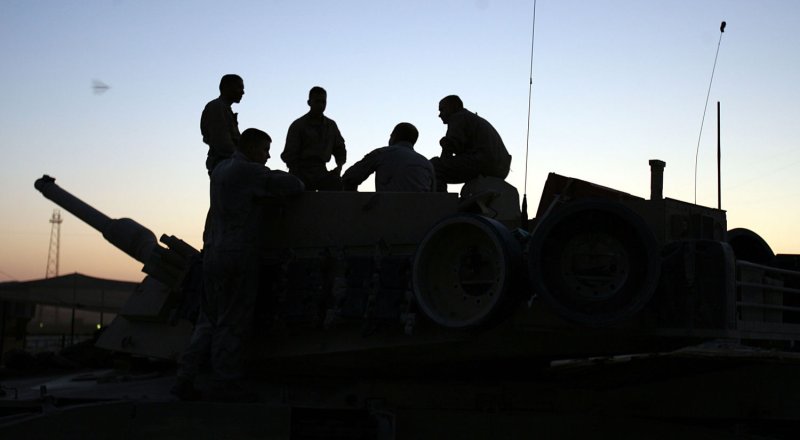Marine Corps "tankers" from the Twentynine Palms, Calif.-based Company C, 1st Tank Battalion, rest aboard one of their M1A1 Main Battle Tanks after a 12-hour work day in Iraq's 110-degeree weather in Al Qa’im, Aug. 5, 2006. (Photo/Antonio Rosas/USMC) |
License Photo
RIYADH, Saudi Arabia, March 15 (UPI) -- Middle East arms sales, such as the massive $67 billion military package for Saudi Arabia, are keeping the U.S. defense industry in business.
These days, with the Arab world in turmoil, two presidents booted out and a third fighting for survival of his authoritarian regime, that strategy is being questioned.
The wave of unrest in the region has given new weight to concerns that the vast arsenals of weapons the United States has sold to Arab states over the years could fall into the hands of anti-American forces.
That's what happened in 1979 when Iran's Islamic revolution ousted Shah Mohammed Reza Pahlavi, the Americans' key ally in the oil-rich Persian Gulf.
The mullahs inherited a U.S.-made armory, including 77 Grumman F-14 Tomcat fighters and 190 McDonnell Douglas F-4 Phantoms, then top-of-the-line combat jets.
The current political turmoil engulfing the Middle East caught everyone by surprise -- the Americans, the Israelis, the regimes themselves -- underlining the dangers that critics have been warning about for so many years.
So far, no extremist Arab regime has emerged although the way things are going that could happen.
But even so, many in the West deem Saudi Arabia and other Arab countries, considered U.S. allies for geo-strategic reasons, to be autocratic and authoritarian and question why they should be armed by the West to keep themselves in power.
Saudi Arabia has taken Iran's place as the Americans' principal ally and bulwark against Iranian expansionism in the gulf even though the Riyadh monarchy is widely considered to be repressive, tolerating no political dissent.
"Saudi Arabia, where 15 of the 19 September 11 hijackers came from, is a family-run dictatorship," U.S. Rep. Ron Paul, R-Texas, declared after the Pentagon announced the huge arms deal with Saudi Arabia.
"So why should the U.S. government, which spends hundreds of billions of dollars yearly and maintains hundreds of bases overseas to push global democracy, approve a deal like that wish such a regime?"
Supporters of massive arms sales to U.S. allies in the Middle East argue that with U.S. forces withdrawing from Iraq, providing massive sales of advanced weapons systems to the gulf states, Egypt and others -- $123 billion worth over the next decade -- ensures that U.S. interests are served.
But with U.S. defense budget cutbacks, it is such sales that keep U.S. military production lines running.
The sale of M1A1 Abrams tanks, designed by General Dynamics Land Systems and the backbone of U.S. armored forces, to Egypt in 1980 saved that line from being terminated.
More recently, Boeing's F-15 Eagle production line in St. Louis was close to shutting down. The U.S. Air Force hadn't bought one since 2001. It was saved by orders from South Korea and Singapore.
But the clincher was the 2010 deal with Saudi Arabia -- 84 new F-15Ss, plus extensive upgrades for another 70 F-15S variants already in the Saudi inventory. The Saudi F-15 order will keep that line running through 2018.
Arms sales are thus a key element of U.S. policy in the Middle East. "U.S. foreign arms sales are a major force for stability, security and even at times democratization around the world," says Daniel Goure of the Lexington Institute's Early Warning Blog.
"Foreign military sales provide a wealth of benefits for the United States and the recipient countries. The role of such sales in supporting regional security is obvious.
"Because it controls the flow of spare parts and the technology to upgrade U.S. systems, Washington can also influence local politics."
U.S. officials justify the massive arms sales to the Arab gulf states as necessary to counter Iran's expansionist objectives.
"The U.S. arms sales … are meant to improve the defense capabilities of the recipient nations, reinforce the sense of U.S. solidarity with its gulf partners and, finally, create a semblance of interoperability with American forces," observed analyst Dan Darling of Forecast International in Connecticut.
"The wildfire of uprisings and protests spreading throughout the region and their present unexpected results, has shown how unpredictable the political and strategic development has become within a matter of a few weeks," said Nicolas von Kospoth of the German Defense Professionals Web site.
Western governments and defense contractors, he said, "may have to deal with an entirely new environment for their traditional and choreographed leverages."















